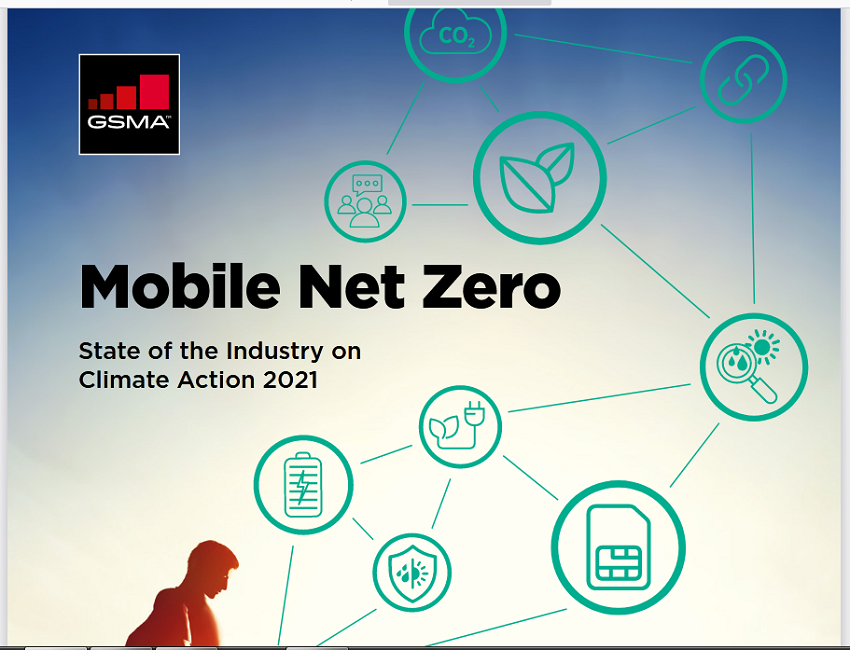On Tuesday 20th April 2021, the Global System for Mobile Communications (GSMA) launched its first-ever and new annual report, “Mobile Net Zero – State of the Industry on Climate Action2021.”
This is the first analysis of how the mobile industry is progressing towards its ambition to be net-zero by 2050.
The report is part of the UNs Campaign, Race to Zero, which aims to rally leadership and support from all non-state actors for a healthy, resilient, zero-carbon recovery. All members are committed to the same overarching goal: halving emissions by 2030 and achieving net-zero emissions by 2050 at the very latest. Led by the High-Level Climate Champions for Climate Action, Race to Zero mobilizes actors outside of national governments to join the Climate Ambition Alliance.
Among the insights in the report were how;
- Mobile operators covering 50% of global mobile connections and 65% of industry revenues have now committed to science-based targets.
- 36% of the mobile industry by revenue and 31% of the mobile industry by connections have credibly committed to net zero emissions by 2050 or earlier through the UN Race to Zero campaign.
- Mobile operators worldwide are stepping up and committing to undertaking the relevant actions necessary to deliver a net-zero world as laid out by the Climate Action Pathways.
- By 2020, 60 mobile operators providing 69% of the world’s mobile connections and 80% of revenue disclosed their climate impacts, risks and opportunities to the Carbon Disclosure Project.
- 5G networks are built with network energy efficiency in mind; 5G’s specification calls for a 90% reduction in the energy used to transfer each bit of data.
- Safaricom recently launched the 5G network in Kenya and is in the process to erect masts in various areas of the country. This will prove important at appoint in the journey to Net-Zero.
- Locally, with 5G being one indicator of compliance, Safaricom which was among the operators mentioned in the report has been on a journey to managing emissions and becoming a net-zero carbon-emitting company by 2050.
According to Safaricom’s Sustainability Report, by the end of 2020, the telco was at a 9% reduction in carbon footprint. This is attributed to various efforts like the partnership between the Kenya Forest Service (KFS) and local community forest associations to grow 5 million trees over a period of 5 years in four different sites to ensure carbon emissions are offset through reforestation. The initiative is expected to offset around 26 per cent of our carbon emissions once the trees have grown to maturity.
The telco also aims to reduce emissions from its supply chain by freighting goods via the sea instead of the air. The carbon footprint and greenhouse gas emissions of ocean or sea freight (goods transported using container ships) is a fraction of that air freight (goods are flown in the holds of cargo planes). Their procurement policy now states that air freight should only be used if there is no viable alternative option.
As an increasing number of business leaders and organisations are acknowledging, the future growth and resilience of successful companies will be determined by their ability to navigate the looming global shift to a low-carbon, clean-technology based economy
Safaricom is also working on areas that focus on energy efficiency, promoting alternative clean energy sources and managing its electronic waste. It is a member of GSMA.
The global mobile industry’s race to net zero emissions is gaining pace as the UN’s Race to Zero campaign declares the industry has made a critical ‘Breakthrough’. Today more than a third of the mobile industry, by revenue, has now credibly committed to achieving net-zero emissions by 2050 or earlier, according to the rigorous criteria of the UN Race to Zero campaign. In January, the mobile industry was the first sector to break through the 20% tipping point necessary to accelerate the systems transformation needed to deliver a zero-carbon world rapidly.








